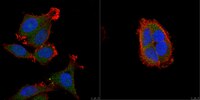ABE2695 Sigma-AldrichAnti-eIF-4E
Anti-eIF-4E, Cat. No. ABE2695, is a highly specific rabbit polyclonal antibody that targets Eukaryotic translation initiation factor 4E and has been tested in Immunocytochemistry and Western Blotting
More>> Anti-eIF-4E, Cat. No. ABE2695, is a highly specific rabbit polyclonal antibody that targets Eukaryotic translation initiation factor 4E and has been tested in Immunocytochemistry and Western Blotting. Less<<Recommended Products
Overview
Key Spec Table
| Species Reactivity | Key Applications | Host | Format | Antibody Type |
|---|---|---|---|---|
| M, R, H | WB, ICC | Rb | Affinity Purified | Polyclonal Antibody |
| Product Information | |
|---|---|
| Format | Affinity Purified |
| Presentation | Purified rabbit polyclonal antibody in buffer containing 0.1 M Tris-Glycine (pH 7.4), 150 mM NaCl with 0.05% sodium azide. |
| Quality Level | MQ100 |
| Storage and Shipping Information | |
|---|---|
| Storage Conditions | Stable for 1 year at 2-8°C from date of receipt. |
| Packaging Information | |
|---|---|
| Material Size | 100 μg |
| Global Trade Item Number | |
|---|---|
| Catalogue Number | GTIN |
| ABE2695 | 04054839324321 |










